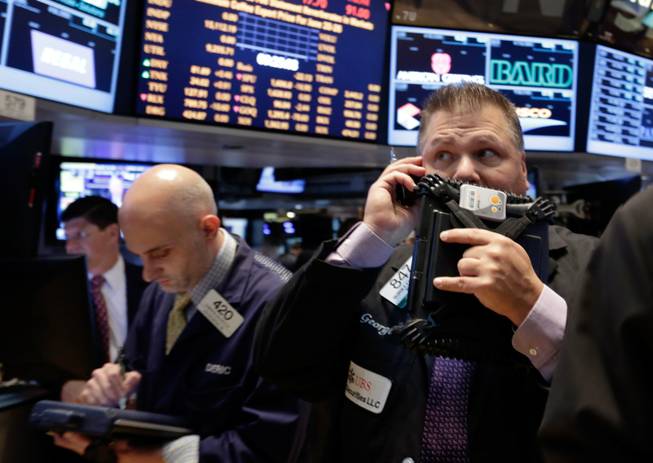
Trader Geroge Ettinger, right, works on the floor of the New York Stock Exchange, Thursday, June 20, 2013.
Friday, June 21, 2013 | 9:32 a.m.
Wall Street steadied after a two-day plunge caused by news that the Federal Reserve was getting ready to wind down its massive bond-buying program by mid-2014.
Markets were a lot calmer Friday. The Dow Jones industrial average was down 24 points, or 0.2 percent, at 14,732 as of 11:24 a.m. Eastern Daylight Time. The Dow and other indexes were moving between small gains and losses in early trading.
The Dow plunged 560 points Wednesday through Thursday, wiping out its gains from May and June. The Fed's easy money policies have been a big driver behind the stock market's bull run the last four years. The plunge came just three weeks after the Dow hit a record high of 15,409.
The Standard & Poor's 500 index fell six points, or 0.4 percent, to 1,582 points. The S&P hit its own record high a month ago.
Kim Forrest, senior analyst with Fort Pitt Capital Group, a portfolio management firm in Pittsburgh, said the market had the "right reaction" to the news that the Fed would wind down its stimulus if the economy continues to improve, but the move may have been overblown.
"We're getting news that made the market uncomfortable," she said. "We shouldn't be sitting at these highs given the fact that the Fed signaled that someday it's going to take some liquidity off the table. So the reaction is right, the magnitude is probably a little off."
The yield on the 10-year Treasury note rose to 2.49 percent from 2.42 percent late Thursday. The yield has risen sharply since Wednesday as investors sold bonds in anticipation that the Fed would slow, and eventually end, its bond purchases.
The yield, which is a benchmark for interest rates on many kinds of loans including home mortgages, is at its highest level since August 2011. On Tuesday, the day before the Fed's announcement, it was 2.19 percent. It hit a low for the year of 1.63 percent on May 3.
Technology shares fell more than the rest of the market after business software maker Oracle reported disappointing earnings late Thursday. Oracle plunged $3.04, or 9 percent, to $30.17, the biggest drop in the S&P 500 index. Oracle is struggling to adapt as customers shift away from software installed on their own computers toward software that runs remotely.
Oracle's results are a poor omen for business spending on technology. Technology stocks in the S&P index fell 1 percent, the most of the 10 industry groups in the index.
The Nasdaq composite index, which is heavily weighted with technology stocks, fell 30 points, or 0.9 percent, to 3,333. Apple, the biggest stock in the index, fell $8.15, or 1.9 percent, to $408.75. Microsoft fell 26 cents, or 0.8 percent, to $33.23.
The price of gold recovered after plunging the day before. Gold was up $6.40, or 0.5 percent, to $1,292.40 an ounce. Crude oil fell $1.15, or 1.2 percent, to $94 a barrel in New York.
The dollar rose against other currencies as traders anticipated that U.S. interest rates would rise as the Fed winds down its bond purchases.
Among other stocks making big moves:
— Darden Restaurants, which runs Olive Garden and Red Lobster, fell $1.16, or 2.3 percent, to $50.07 after rising expenses hurt its fourth-quarter earnings.
— CarMax, which runs used car dealerships, reported that its first-quarter profit jumped 21 percent as sales rose. Its stock rose 63 cents or 1.4 percent, to $45.20.
A Fed policy statement and comments from Fed Chairman Ben Bernanke started the selling in stocks, bonds and commodities Wednesday. Bernanke said the Fed expects to scale back its bond-buying program later this year and end it by mid-2014 if the economy continues to improve. The bank has been buying $85 billion a month in Treasury and mortgage bonds, which has made borrowing cheap for consumers and businesses. The program has also encouraged investors to buy stocks instead of bonds.
The S&P 500 is still up 11.9 percent, for the year, not far from its full-year increase of 13.4 percent last year.
Overseas, Japan's Nikkei index rose 1.7 percent, but other Asian markets fell. European markets slipped. France's CAC-40 fell 0.3 percent and Germany's DAX fell 0.9 percent.

Join the Discussion:
Check this out for a full explanation of our conversion to the LiveFyre commenting system and instructions on how to sign up for an account.
Full comments policy